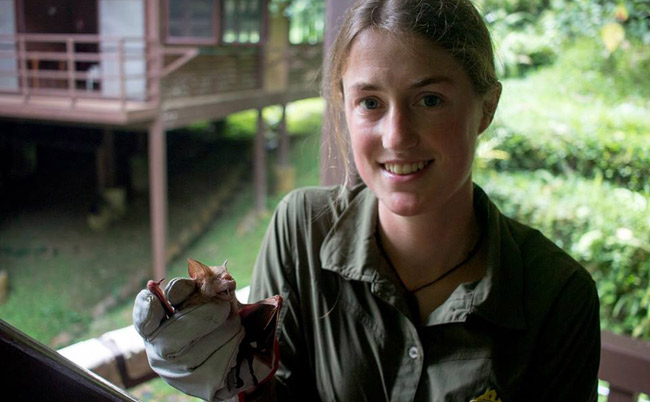Thursday 11 April 2019 9:27pm

Tegan Murrell holds a male diadem roundleaf bat (Hipposideros diadema)during her trip to Borneo on an Otago field trip. The bats are known for their feisty nature. “They were not afraid to give our gloved fingers a chomp, and are big enough to catch birds out of the sky,” she says.
Tegan Murrell knew she was taking the right course when her lecturer announced a new paper on tropical ecology involving a three-week field trip to Borneo.
“I thought what an amazing opportunity that would be to run off to the rainforest,” Murrell says.
Two years later in 2018, Murrell joined nine other students on the tropical ecology paper’s inaugural field trip to Borneo.
Now a postgraduate student studying for her masters in zoology, she says the trip changed the course of her life.
"I was never going to come back to university for postgraduate study, I never saw myself as a postgraduate student. But I was totally inspired by the tropical course and it changed the way I thought I was going in life."
“I was never going to come back to university for postgraduate study, I never saw myself as a postgraduate student,” Murrell says. “But I was totally inspired by the tropical course and it changed the way I thought I was going in life.”
Led by Professor Phil Bishop, 10 Otago ecology students participated in the three-week trip and worked alongside colleagues from the University Brunei Darussalam at a jungle field centre located in the ancient and pristine Ulu Temburong rainforest.
The students participated in an on-going amphibian project and given an opportunity to undertake their own research, which Murrell seized to study bats.
“I was brought up living in an old house in Wales, and often in the mornings bats would be hanging from the rafters in the living room after falling down the chimney,” Murrell says.
On that first trip to Borneo, Murrell worked with local researcher Professor Ulmar T Grafe on a bat density study.
“Over six trapping nights we caught about twenty bats, but the most amazing thing was this small sample included nine different species which is huge,” Murrell says.
This research was subsequently published in Scientia Bruneiana (the official journal of the Faculty of Science, Universiti Brunei Darussalam), and Murrell credits the ecology programme’s research-led learning approach where students take responsibility for their research from first year.
“Undergraduate students undertake brand new research in their labs from day one, so we don’t know what answers they are going to get, which can lead to some being published,” Professor Bishop says.
Murrell says the approach is based around learning by doing and is very applied and practical.
“One of the most valuable things this research-led approach has taught me is flexibility, as field work rarely proceeds in the way that textbooks would suggest.”
"Ecology students develop a strong sense of responsibility and ownership that they can take away with them at the end of the course, and graduate surveys are showing this approach is working."
Professor Tony Harland of the Higher Education Development Centre and Chair of Ecology says this learning approach with three years of authentic research training allows students to contribute to science while radically changing their educational experiences.
“Ecology students develop a strong sense of responsibility and ownership that they can take away with them at the end of the course, and graduate surveys are showing this approach is working,” Professor Harland says.
Murrell has just made her second trip to Borneo with the paper, this time attending as a postgraduate student and continuing her research with bats.
“It’s such an amazing place to go and see such a diverse habitat and pristine rainforest, as there are so few places left untouched like this in the world.”
Murrell describes some of her experiences from the “deafening noise” while walking through the rainforest in the dark, to witnessing glowing leaves during heavy rainfall.
“It was simply a beautiful, beautiful place, and when we weren’t working, we could just sit and enjoy the actual ecology of the rainforest.”
